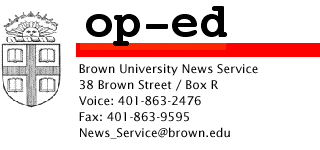

|
Distributed October 2000 Copyright ©2000 by Charles T. Call |
Op-Ed Editor: Janet Kerlin About 765 Words |
|
Charles T. Call In Yugoslavia, now for the hard part The West should add incentives for Yugoslavia’s old guard to cede key posts without fueling nationalist fears. It should offer economic, security and judicial aid conditioned on pro-democracy leadership in key institutions, especially the police, the judiciary and the military. The West should temporarily delay action on Milosevic’s war crimes indictment, waiting until Kostunica’s allies have consolidated power. So you thought that the world could breathe easy and stop worrying about Yugoslavia? Slobodan Milosevic is finally out and a new pro-West, democratic government is safely in power in Belgrade. Wait! The real struggle for power only began with Milosevic’s acceptance of Vojislav Kostunica’s electoral victory. The current struggle for control over the state itself – the police, the judiciary, the military and economic decision-making bodies – will determine the future of democracy in Yugoslavia. Now is the crucial time for Western powers to support Kostunica. Since Kostunica was sworn in as president, he and pro-democracy forces have tried to consolidate their power by ousting Milosevic loyalists from government. Many officials and pro-Milosevic business leaders have resigned, in some cases threatened by crowds of workers and Kostunica loyalists. More recently, however, Milosevic supporters in the military and state bureaucracy have begun to show resistance. Senior military generals warned against any attempt to oust them, and Milosevic loyalists continue to dominate the Serb police, the judiciary and other ministries. Milosevic’s Socialist Party, which heads the ruling alliance in the powerful Serb parliament, has resisted attempts to move up parliamentary elections to December. Experience in other countries shows that these challenges to Kostunica’s control over state institutions are crucial. Two lessons stand out. First, new democratic leaders are relatively powerless when state bureaucracy remains in the hands of authoritarian forces. Take the case of Chile in 1989, when a pro-democracy opposition candidate won the presidency against notorious strongman Gen. Augusto Pinochet. The change of government did not end authoritarian influence over the state. Pinochet remained head of the armed forces for eight more years, and the military and police remained off-limits to reform. Pinochet loyalists also populated the judiciary, while regime-appointed “senators-for-life” helped block legislation. Only Pinochet’s 1998 arrest in London began to break the old guard’s chokehold on state power. Second, prior democratic transitions show that the euphoria of popular new democracies is short-lived, so quick action is vital. The classic case is Argentina. There, new democratic president Raul Alfonsin was elected with widespread support in 1983 and initiated trials of army officers. However, he faced three coup attempts from a recalcitrant military, eventually losing support and resigning from office. Conventional wisdom now holds that Alfonsin did not move swiftly enough against the top levels of the armed forces when he first came to power. For Kostunica, the main lesson of the last 20 years of democratic transitions is: “Your popular mandate is likely to erode, so act quickly to transform key state institutions.” So far, the new government is following this lesson. Because Kostunica’s powers as a federal president are limited, his alliance must gain legitimate power in the republic-level government of Serbia. The pro-democracy alliance has therefore prioritized moving up parliamentary elections. Kostunica also recognizes the urgency of keeping Milosevic holdovers from interfering with eventual elections or with attempts to restore freedoms of the press and civil and political liberties. His government has reached agreement with Milosevic allies to share power with new appointees in such key institutions as the media, finance ministry, judiciary and the republic-controlled police. So far, so good. But the fate of these efforts remains uncertain. What can the West do? In short, the West should add incentives for the old guard to cede key posts without fueling nationalist fears. It should offer economic, security and judicial aid conditioned on pro-democracy leadership in key institutions, especially the police, the judiciary and the military. The West should also urge that those indicted for human rights crimes be removed from office, including Serbian president Milan Milutinovic. Milosevic allies need not be wholly purged from state institutions. But millions of dollars in Western aid would be silly if Milosevic cronies retained key posts, able to steal elections or deprive citizens of basic rights. In addition, Western leaders should alleviate the Yugoslav military’s fears that they seek to weaken military capabilities for strategic gain. Obviously, the horrific costs of the NATO bombing campaign remain foremost in the minds of all Yugoslavs. Western donors must offer reassurances that NATO is not acting to punish military leaders but to advance multi-party democracy. Meanwhile, the West should temporarily delay action on Milosevic’s war crimes indictment, waiting until Kostunica’s allies have consolidated power. The success of Yugoslavia’s current democratic transition still hangs in the balance. The next few weeks will determine whether the new government’s popular mandate can be transformed into control of the instruments of power. Now is not the time to celebrate or turn attention elsewhere, but to judiciously prevent Milosevic allies from crippling a nascent democracy. Charles T. Call is an assistant professor for research at Brown University’s Watson Institute for International Studies. Last year, he conducted research in Kosovo and Bosnia. ###### | |